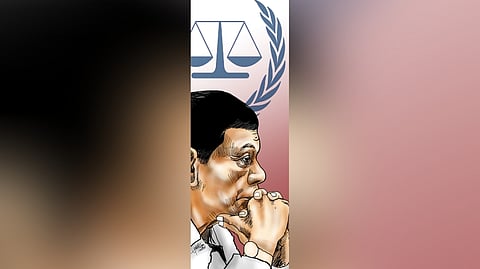
- NEWS
- the EDIT
- COMMENTARY
- BUSINESS
- LIFE
- SHOW
- ACTION
- GLOBAL GOALS
- SNAPS
- DYARYO TIRADA
- MORE

The International Criminal Court (ICC) has postponed the confirmation hearing on the charges against former President Rodrigo Duterte. It was set to begin on 23 September, a date the drug war victims’ families had circled with trembling fingers, the day they thought would mark the beginning of a long-sought accountability.
The delay resulted from a motion by Duterte’s defense team who cited his worsening medical condition. His lawyer, Nicholas Kaufman, said his client was not fit to stand trial, noting that detention had accelerated the decline of the 80-year-old who, while still in “good spirits,” was no longer able to properly instruct his counsel or absorb the mountain of evidence piled before him.
Kaufman said independent medical experts, including one not picked by the defense, had reached the same conclusion. His request was straightforward: let Duterte return home to the Philippines on an interim release to live out the judicial process with a measure of dignity rather than in a foreign cell.
The request, however, has been met with anger. Families of the victims had expected the courtroom lights to shine a harsh glare on Duterte’s alleged crimes — the extrajudicial killings, the funding of death squads, the horror stitched into the fabric of his “war on drugs.”
Understandably, they are bitter, even furious, that the day of reckoning has been pushed further into the horizon. And who can blame them? Every delay feels like a betrayal to them. But here lies the dilemma of a court that insists on the highest standards of due process.
The ICC was built on the premise that even the worst of men are entitled to the best of trials. It cannot rail against impunity, on one hand, while turning a blind eye to the condition of the accused, on the other.
Kaufman’s argument is not about innocence or guilt, nor is it an evasion of accountability. It is about whether an octogenarian, supposedly in fragile health, can meaningfully participate in the proceedings against him. A trial without a fit defendant is no trial at all — it is a performance that will undermine the very legitimacy of the court.
The ICC Pre-Trial Chamber, by a majority decision, recognized this tension. It granted a limited postponement to consider the defense request, though not without dissent. Judge María del Socorro Flores Liera wanted the process to march on, refusing to dignify what she read as delaying tactics. But the majority rule here signaled caution — that justice hurried is justice compromised.
The ICC finds itself in an unenviable position. Approve an interim release and it risks enraging the victims, who will see it as another way out for the man they believe orchestrated a mass murder. Reject it, and the court itself may stand accused of sacrificing fairness for expediency, of putting vengeance above principle.
Kaufman is playing on that tension masterfully. His plea is not cloaked in bluster but in the sober language of rights — the right of an accused to understand and respond, the right to be treated humanely even when charged with inhumanity.
It is precisely here that the ICC must tread carefully. To deny an interim release, despite credible medical evidence, would be to fracture the moral ground on which the court stands. To grant it is not to absolve Duterte, nor to silence his victims. It is merely to keep the promise that even he is afforded the protections he denied so many others. That is not weakness; it is strength.
Justice, after all, is not vengeance in robes. It is principle in practice. And if the ICC means to prove itself worthy of history, it must show that principle applies to the guilty as much as to the innocent, to the powerful as much as to the powerless. Even, yes, to Rodrigo Duterte.
